-
 Bitcoin
Bitcoin $83,681.2500
0.42% -
 Ethereum
Ethereum $1,816.3925
-0.25% -
 Tether USDt
Tether USDt $0.9997
0.02% -
 XRP
XRP $2.1251
3.00% -
 BNB
BNB $596.2965
0.41% -
 Solana
Solana $122.0683
4.38% -
 USDC
USDC $1.0001
0.02% -
 Dogecoin
Dogecoin $0.1704
4.62% -
 Cardano
Cardano $0.6613
1.49% -
 TRON
TRON $0.2388
0.31% -
 Chainlink
Chainlink $12.9421
0.33% -
 UNUS SED LEO
UNUS SED LEO $9.1716
-2.85% -
 Toncoin
Toncoin $3.3936
-4.79% -
 Stellar
Stellar $0.2594
-0.77% -
 Avalanche
Avalanche $18.1419
-0.44% -
 Sui
Sui $2.2409
-0.91% -
 Shiba Inu
Shiba Inu $0.0...01232
0.99% -
 Hedera
Hedera $0.1638
-0.23% -
 Litecoin
Litecoin $84.5108
1.45% -
 Polkadot
Polkadot $4.0325
-0.58% -
 MANTRA
MANTRA $6.2700
-2.60% -
 Bitcoin Cash
Bitcoin Cash $301.8114
0.09% -
 Bitget Token
Bitget Token $4.5258
0.41% -
 Dai
Dai $1.0000
0.01% -
 Ethena USDe
Ethena USDe $0.9991
-0.05% -
 Hyperliquid
Hyperliquid $11.9363
0.54% -
 Monero
Monero $214.7500
-0.58% -
 Uniswap
Uniswap $5.9000
0.13% -
 Pi
Pi $0.5128
-10.32% -
 Pepe
Pepe $0.0...07253
6.41%
Cryptocurrency wallet security guide: the difference between hot wallets and cold wallets
Hot wallets are ideal for frequent crypto transactions but vulnerable to hacks; cold wallets offer superior security for long-term storage. Choose based on your needs.
Apr 02, 2025 at 03:42 pm
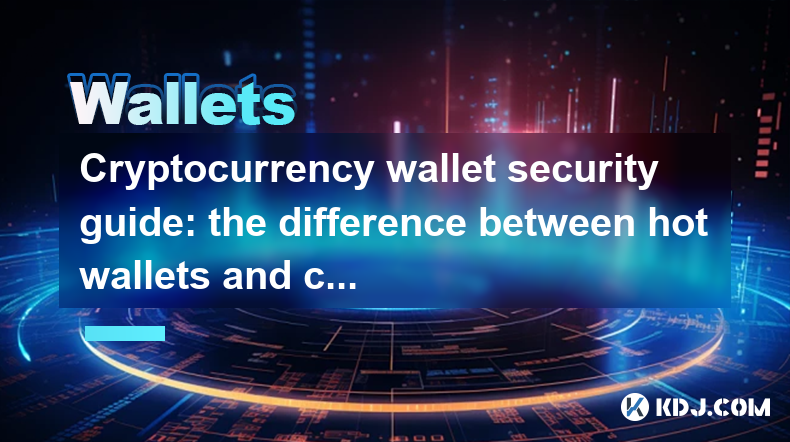
Cryptocurrency wallet security is paramount for anyone involved in the crypto space. Understanding the differences between hot wallets and cold wallets is essential for safeguarding your digital assets. Hot wallets are connected to the internet, making them convenient for frequent transactions but more vulnerable to hacking. On the other hand, cold wallets are offline, offering a higher level of security but less convenience for everyday use. This guide will delve into the specifics of both types of wallets, their security features, and how to choose the right one for your needs.
What is a Hot Wallet?
A hot wallet is a type of cryptocurrency wallet that is connected to the internet. This connectivity makes hot wallets ideal for frequent transactions, as they allow for quick and easy access to your funds. However, this convenience comes with a trade-off in security. Because hot wallets are online, they are more susceptible to hacking and cyber attacks. Examples of hot wallets include software wallets installed on your computer or mobile device, as well as web-based wallets provided by cryptocurrency exchanges.
Hot wallets are often used for smaller amounts of cryptocurrency that you plan to use regularly. They are not recommended for storing large amounts of digital assets due to their vulnerability to online threats. To enhance the security of a hot wallet, it's crucial to use strong, unique passwords, enable two-factor authentication (2FA), and keep your software up to date. Despite these measures, the inherent risk of being connected to the internet remains a significant concern.
What is a Cold Wallet?
A cold wallet, in contrast, is a type of cryptocurrency wallet that is not connected to the internet. This offline nature makes cold wallets much more secure than their hot counterparts, as they are not susceptible to online hacking attempts. Cold wallets are ideal for storing larger amounts of cryptocurrency that you do not need to access frequently. Common types of cold wallets include hardware wallets, which are physical devices that store your private keys offline, and paper wallets, which involve printing out your private keys and storing them in a secure physical location.
The primary advantage of cold wallets is their high level of security. Since they are not connected to the internet, they are immune to many of the cyber threats that plague hot wallets. However, this security comes at the cost of convenience. Accessing your funds from a cold wallet can be more cumbersome, as you need to physically connect the wallet to a device or manually enter your private keys. Despite this, for long-term storage and large amounts of cryptocurrency, cold wallets are the preferred choice for many investors.
Security Features of Hot Wallets
Hot wallets come with several security features designed to protect your digital assets. One of the most common is two-factor authentication (2FA), which adds an extra layer of security by requiring a second form of verification, such as a text message or an authentication app, in addition to your password. Another important feature is encryption, which ensures that your private keys are stored securely and can only be accessed by you. Many hot wallets also offer multi-signature (multi-sig) support, which requires multiple signatures to authorize a transaction, adding an additional layer of security.
Despite these features, hot wallets are still vulnerable to certain types of attacks. Phishing attacks, where hackers trick you into revealing your private keys or passwords, are a significant risk. Additionally, malware can compromise your device and steal your wallet information. To mitigate these risks, it's essential to use reputable hot wallet providers, keep your software updated, and be vigilant about the security of your devices. While hot wallets can be secure with the right precautions, they are inherently less safe than cold wallets due to their internet connectivity.
Security Features of Cold Wallets
Cold wallets offer robust security features that make them the preferred choice for long-term storage of cryptocurrency. Hardware wallets, for example, store your private keys on a secure chip within the device, which is not accessible via the internet. This makes them highly resistant to hacking attempts. Many hardware wallets also feature PIN protection, requiring you to enter a PIN to access your funds, adding an extra layer of security. Additionally, some hardware wallets support recovery phrases, which allow you to restore your wallet if it is lost or damaged.
Paper wallets are another form of cold storage, where your private keys are printed on a piece of paper and stored in a secure physical location. While paper wallets are simple and cost-effective, they require careful handling to prevent physical damage or loss. Both hardware and paper wallets are immune to online threats, making them ideal for storing large amounts of cryptocurrency. However, they require more effort to use, as you need to physically connect the hardware wallet or manually enter the private keys from a paper wallet to access your funds.
Choosing Between Hot and Cold Wallets
Choosing between a hot wallet and a cold wallet depends on your specific needs and how you plan to use your cryptocurrency. If you need to make frequent transactions and require quick access to your funds, a hot wallet may be the better choice. However, it's crucial to only store small amounts of cryptocurrency in a hot wallet due to the higher risk of online attacks. For larger amounts of cryptocurrency that you plan to hold for the long term, a cold wallet is the more secure option. Cold wallets offer superior protection against hacking and cyber threats, making them ideal for long-term storage.
When deciding between hot and cold wallets, consider the following factors:
- Frequency of Transactions: If you need to access your cryptocurrency frequently, a hot wallet is more convenient. For less frequent access, a cold wallet is more secure.
- Amount of Cryptocurrency: Store smaller amounts in hot wallets and larger amounts in cold wallets to balance convenience and security.
- Security Needs: If security is your top priority, a cold wallet is the best choice. If you're willing to take on more risk for convenience, a hot wallet may suffice.
- Ease of Use: Hot wallets are generally easier to use, while cold wallets require more effort to set up and access.
Best Practices for Hot Wallet Security
To maximize the security of your hot wallet, follow these best practices:
- Use Strong Passwords: Create unique, complex passwords for your hot wallet and change them regularly.
- Enable Two-Factor Authentication (2FA): Always use 2FA to add an extra layer of security to your wallet.
- Keep Software Updated: Regularly update your wallet software to protect against known vulnerabilities.
- Beware of Phishing: Be cautious of emails or messages asking for your wallet information and never share your private keys.
- Use Reputable Providers: Only use hot wallets from well-known, reputable providers to minimize the risk of using compromised software.
- Monitor Your Wallet: Regularly check your wallet for any unauthorized transactions and report any suspicious activity immediately.
By following these best practices, you can enhance the security of your hot wallet and reduce the risk of losing your cryptocurrency to cyber attacks.
Best Practices for Cold Wallet Security
To ensure the security of your cold wallet, adhere to these best practices:
- Store Safely: Keep your hardware wallet in a secure, physical location, such as a safe or a locked drawer.
- Use a Strong PIN: Set a strong, unique PIN for your hardware wallet and never share it with anyone.
- Backup Your Recovery Phrase: Write down your recovery phrase and store it in a secure, separate location from your hardware wallet.
- Avoid Online Exposure: Never connect your hardware wallet to an untrusted computer or device, as this could expose it to malware.
- Protect Paper Wallets: If using a paper wallet, store it in a waterproof and fireproof container, and consider laminating it to protect against physical damage.
- Limit Access: Only access your cold wallet when necessary, and always do so in a secure environment.
By following these best practices, you can maximize the security of your cold wallet and protect your cryptocurrency from both online and physical threats.
Common Questions About Hot and Cold Wallets
Q: What is the main difference between a hot wallet and a cold wallet?
A: The main difference is that hot wallets are connected to the internet, making them convenient for frequent transactions but more vulnerable to hacking. Cold wallets, on the other hand, are offline, offering a higher level of security but less convenience for everyday use.
Q: Can I use both a hot wallet and a cold wallet?
A: Yes, many cryptocurrency users use both types of wallets. They store smaller amounts of cryptocurrency in a hot wallet for daily transactions and larger amounts in a cold wallet for long-term storage.
Q: How do I know which type of wallet is right for me?
A: Consider your transaction frequency, the amount of cryptocurrency you plan to store, your security needs, and the ease of use. If you need quick access to your funds and are willing to take on more risk, a hot wallet may be suitable. For long-term storage and higher security, a cold wallet is the better choice.
Q: Are cold wallets completely secure?
A: While cold wallets are highly secure against online threats, they are not immune to all risks. Physical theft, loss, or damage can still compromise a cold wallet. It's essential to follow best practices for securing your cold wallet to minimize these risks.
Q: What should I do if my hot wallet is compromised?
A: If you suspect your hot wallet has been compromised, immediately transfer your funds to a new, secure wallet. Change all related passwords and enable 2FA if you haven't already. Report the incident to the wallet provider and consider using a cold wallet for future storage of larger amounts of cryptocurrency.
Q: How often should I move my cryptocurrency from a hot wallet to a cold wallet?
A: It depends on your usage and security preferences. As a general rule, keep only the amount of cryptocurrency you need for immediate transactions in your hot wallet. Move any excess funds to a cold wallet regularly to minimize risk. Some users transfer funds weekly or monthly, while others do so after each transaction.
Q: Can I store multiple cryptocurrencies in one wallet?
A: Yes, many hot and cold wallets support multiple cryptocurrencies. Check the specifications of the wallet you are considering to ensure it supports all the cryptocurrencies you plan to store.
Q: What happens if I lose my cold wallet?
A: If you lose your cold wallet, you can recover your funds using the recovery phrase if you have one. It's crucial to store your recovery phrase in a secure, separate location from your wallet. If you don't have a recovery phrase, your funds may be irretrievable, highlighting the importance of proper backup and storage practices.
Disclaimer:info@kdj.com
The information provided is not trading advice. kdj.com does not assume any responsibility for any investments made based on the information provided in this article. Cryptocurrencies are highly volatile and it is highly recommended that you invest with caution after thorough research!
If you believe that the content used on this website infringes your copyright, please contact us immediately (info@kdj.com) and we will delete it promptly.
- Ripple (XRP) Targets $5 in 5 Weeks.
- 2025-04-05 08:30:12
- Hamster Kombat Becomes a Huge Hit in the Crypto Gaming World
- 2025-04-05 08:30:12
- TOY CHAIN has partnered with the AWS Generative AI Innovation Center to build TAIX
- 2025-04-05 08:25:12
- Institutional Investors Questioning the Growing Correlation Between Bitcoin and Tech Stocks
- 2025-04-05 08:25:12
- BitMEX Founder Arthur Hayes Predicts Bitcoin (BTC) Will Resist Selling Pressure and Hold $76.5k Until the US Tax Deadline
- 2025-04-05 08:20:12
- Cryptocurrency Whale Deposits 71448 Solana (SOL) Worth $8.55 Million into Binance
- 2025-04-05 08:20:12
Related knowledge
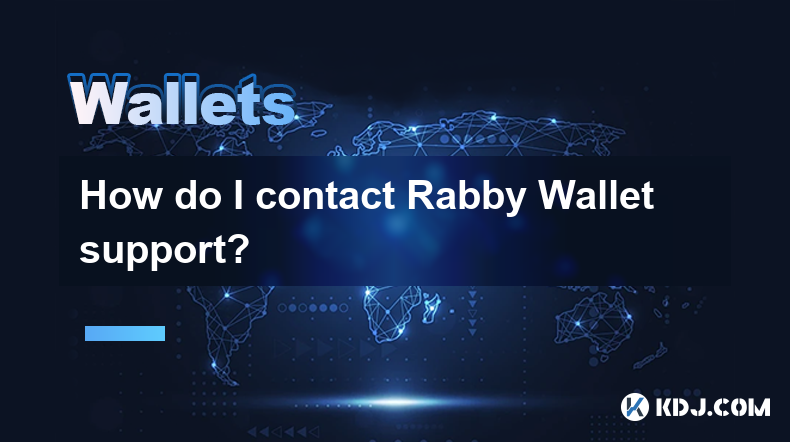
How do I contact Rabby Wallet support?
Apr 04,2025 at 08:42am
Introduction to Rabby Wallet SupportIf you are a user of Rabby Wallet and need assistance, knowing how to contact their support team is crucial. Rabby Wallet offers various methods to reach out for help, ensuring that users can get the support they need efficiently. This article will guide you through the different ways to contact Rabby Wallet support, ...
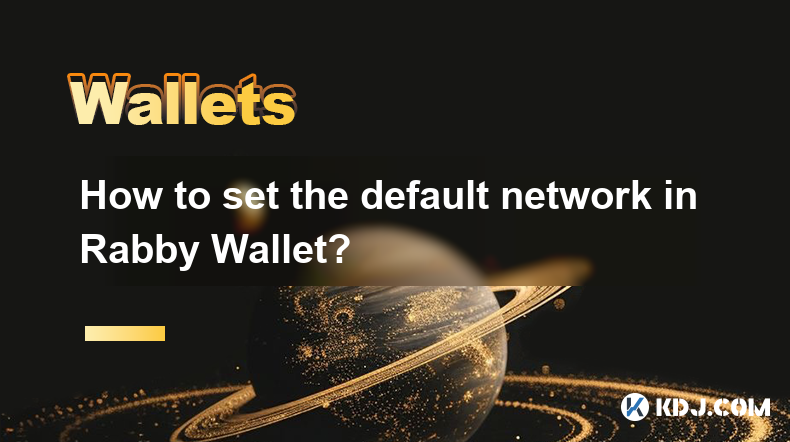
How to set the default network in Rabby Wallet?
Apr 04,2025 at 06:35am
Setting the default network in Rabby Wallet is a crucial step for users who frequently interact with different blockchain networks. This guide will walk you through the process of setting your preferred network as the default, ensuring a seamless experience when managing your cryptocurrencies. Whether you're using Ethereum, Binance Smart Chain, or any o...
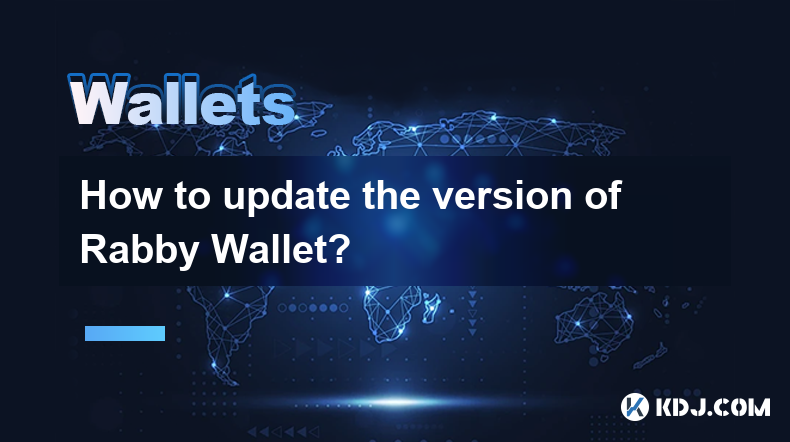
How to update the version of Rabby Wallet?
Apr 05,2025 at 02:14am
Updating the version of Rabby Wallet is an essential task to ensure you have the latest features, security enhancements, and bug fixes. This guide will walk you through the process of updating Rabby Wallet on different platforms, including desktop and mobile devices. Let's dive into the detailed steps for each platform. Updating Rabby Wallet on DesktopU...
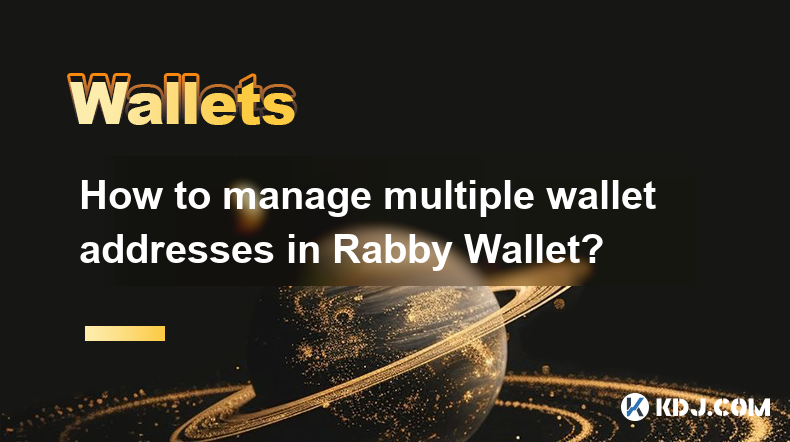
How to manage multiple wallet addresses in Rabby Wallet?
Apr 05,2025 at 07:14am
Managing multiple wallet addresses in Rabby Wallet can significantly enhance your cryptocurrency management experience. Whether you're a seasoned crypto enthusiast or a beginner, understanding how to efficiently handle multiple addresses can streamline your transactions and improve your security. In this article, we will explore the detailed steps and b...
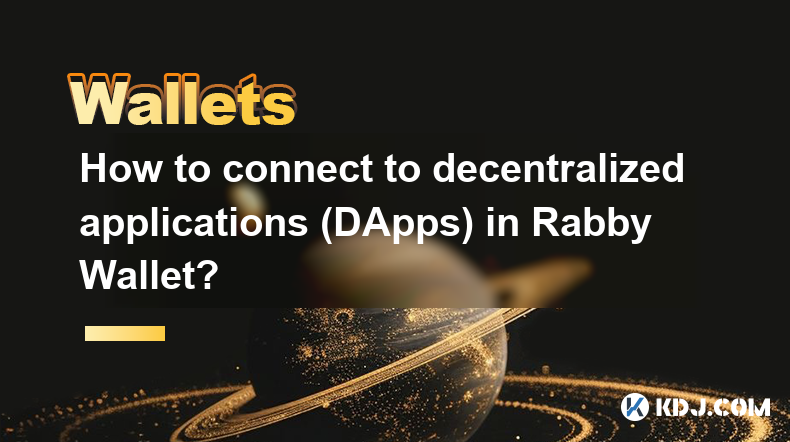
How to connect to decentralized applications (DApps) in Rabby Wallet?
Apr 05,2025 at 01:28am
Connecting to decentralized applications (DApps) using Rabby Wallet is a straightforward process that enhances your interaction with the burgeoning world of blockchain technology. Rabby Wallet, known for its user-friendly interface and robust security features, allows users to seamlessly interact with a variety of DApps across different blockchains. Thi...
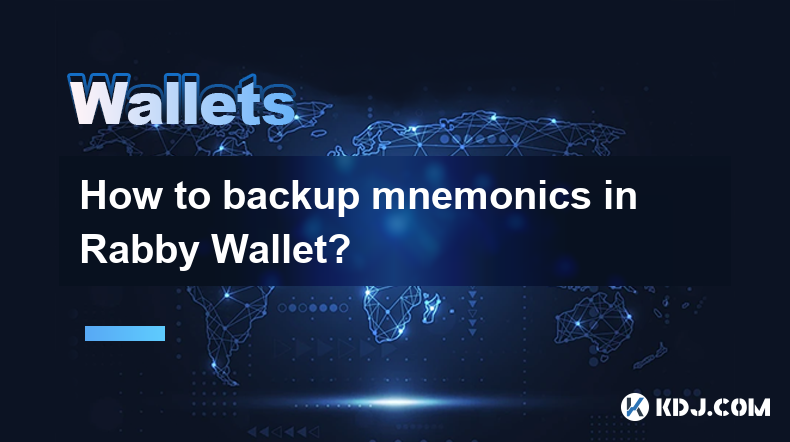
How to backup mnemonics in Rabby Wallet?
Apr 04,2025 at 02:21pm
Introduction to Rabby Wallet and MnemonicsRabby Wallet is a popular cryptocurrency wallet that offers users a secure way to manage their digital assets. One of the key features of Rabby Wallet is the use of mnemonics, which are a series of words that serve as a backup for your wallet. These mnemonics are crucial because they allow you to recover your wa...

How do I contact Rabby Wallet support?
Apr 04,2025 at 08:42am
Introduction to Rabby Wallet SupportIf you are a user of Rabby Wallet and need assistance, knowing how to contact their support team is crucial. Rabby Wallet offers various methods to reach out for help, ensuring that users can get the support they need efficiently. This article will guide you through the different ways to contact Rabby Wallet support, ...

How to set the default network in Rabby Wallet?
Apr 04,2025 at 06:35am
Setting the default network in Rabby Wallet is a crucial step for users who frequently interact with different blockchain networks. This guide will walk you through the process of setting your preferred network as the default, ensuring a seamless experience when managing your cryptocurrencies. Whether you're using Ethereum, Binance Smart Chain, or any o...

How to update the version of Rabby Wallet?
Apr 05,2025 at 02:14am
Updating the version of Rabby Wallet is an essential task to ensure you have the latest features, security enhancements, and bug fixes. This guide will walk you through the process of updating Rabby Wallet on different platforms, including desktop and mobile devices. Let's dive into the detailed steps for each platform. Updating Rabby Wallet on DesktopU...

How to manage multiple wallet addresses in Rabby Wallet?
Apr 05,2025 at 07:14am
Managing multiple wallet addresses in Rabby Wallet can significantly enhance your cryptocurrency management experience. Whether you're a seasoned crypto enthusiast or a beginner, understanding how to efficiently handle multiple addresses can streamline your transactions and improve your security. In this article, we will explore the detailed steps and b...

How to connect to decentralized applications (DApps) in Rabby Wallet?
Apr 05,2025 at 01:28am
Connecting to decentralized applications (DApps) using Rabby Wallet is a straightforward process that enhances your interaction with the burgeoning world of blockchain technology. Rabby Wallet, known for its user-friendly interface and robust security features, allows users to seamlessly interact with a variety of DApps across different blockchains. Thi...

How to backup mnemonics in Rabby Wallet?
Apr 04,2025 at 02:21pm
Introduction to Rabby Wallet and MnemonicsRabby Wallet is a popular cryptocurrency wallet that offers users a secure way to manage their digital assets. One of the key features of Rabby Wallet is the use of mnemonics, which are a series of words that serve as a backup for your wallet. These mnemonics are crucial because they allow you to recover your wa...
See all articles





















































































